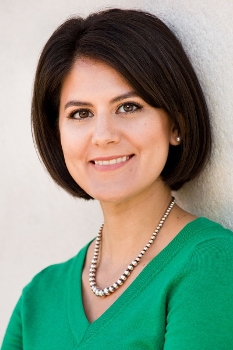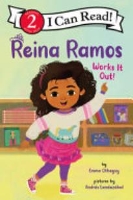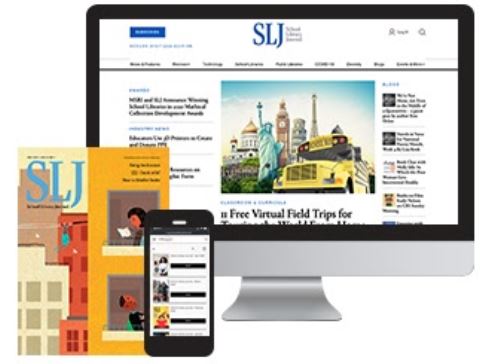My Book Was Segregated by Scholastic Until It Wasn’t. Will Anything Change? | Opinion
Emma Otheguy's "I Can Read!" book Reina Ramos Works It Out was among the 64 titles in Scholastic's controversial "Share Every Story, Celebrate Every Voice" collection.
 I celebrated when I found out I was going to have a book in the beloved Scholastic Book Fair, but my excitement was short-lived. Just two weeks after I heard the good news, I learned that Scholastic placed Reina Ramos Works It Out, my early reader about a vivacious second grader, in a separate collection that schools could easily decline to order.
I celebrated when I found out I was going to have a book in the beloved Scholastic Book Fair, but my excitement was short-lived. Just two weeks after I heard the good news, I learned that Scholastic placed Reina Ramos Works It Out, my early reader about a vivacious second grader, in a separate collection that schools could easily decline to order.
Then, after a week of angry responses from librarians and authors about the collection titled "Share Every Story, Celebrate Every Voice," Scholastic reversed course, announcing a "pivot" regarding the collection for the rest of the year. The company acknowledged in a letter to authors that it had been a mistake to segregate—their word—books like mine. Starting in January, this separate, “elective” box will not be part of Scholastic's fairs.
 This was welcome news. But the whiplash left me exhausted, reminding me how fragile success can be for diverse authors. I had been mourning the original decision, growing more angry. Now I’m just sad.
This was welcome news. But the whiplash left me exhausted, reminding me how fragile success can be for diverse authors. I had been mourning the original decision, growing more angry. Now I’m just sad.
For authors like me, the pain of being sidelined will continue long past the start of a new year.
Being relegated to diversity lists is routine for authors of color. I have had school visits abruptly canceled without explanation. At conferences I’ll be asked to speak about my identity, instead of about books and the craft of writing. I’m very familiar with this pattern.
The only difference is now, the entire publishing industry is dealing with legislation in 30 states that effectively limits books about Black, queer, and Latino kids in schools. Scholastic officials stated that they created this optional box in order to protect teachers, librarians, and volunteers from being fired or sued if states were to enforce this legislation.
Ostensibly, these laws exist to protect children. But let’s be serious: Reina Ramos Works It Out is simply a story about someone who happens to be Latina. What message do we send children when we label books like mine as potentially unlawful? We’re telling every kid like Reina—brown and bilingual—that there’s something potentially wrong with them, just by being who they are.
To racists or xenophobes, nothing is as threatening as the thought of Latino children living lives full of dance and play. The bigots want us to struggle and to feel shame.
Too bad for them that Reina Ramos, the protagonist of the book, is all about exuberance. She dances with her abuela, runs and jumps on the playground, and dresses up as Celia Cruz, because if your name means queen, why not be the queen of salsa?
Also read: "Building Better Book Fairs: Librarians Create New Models"
When I read the book at school visits, I teach the kids about Celia’s famous catch-phrase “¡Azúcar!” I wish you could see (and hear) the joy of a gymnasium full of kids practicing their best “¡Azúcar!”
I remember the joy of another gymnasium, my own elementary school on the day of the Scholastic Book Fair. Not only could kids get more affordable books at the fair, they could also get to choose what to read for themselves. That empowerment—and joy—are central to my memory. For a child of the '90s, there's a unique nostalgia to the Scholastic Book Fair.
But inclusion in the Scholastic Book Fair isn’t just the fulfillment of a childhood dream. I have always sought to share my voice as widely as I can, and that’s what the Fair does, reaching roughly 120,000 schools per year. I have been the too-loud Latina a thousand times, I have been on the receiving end of many a microaggression. Nothing heals the silencing of my voice like hundreds of kids shouting gleefully in Spanish.
It’s why I wanted to write an early reader in the first place. I wanted to belong the way beloved characters like Frog and Toad belong, I wanted my people alongside them with that unique seal of legitimacy: the “I Can Read” banner.
When I had the chance to write for the “I Can Read” series—published by HarperCollins, which licensed the book to Scholastic for the fair—I was overjoyed. These were the books that taught me how to read and to love literature. To write a new character for “I Can Read” has been a privilege and a work of love.
But no matter how far you get, azúcar can quickly turn bitter.
There are 64 books in the optional Scholastic collection. I am in terrific company, with luminaries like Amanda Gorman, as well as biographies of John Lewis, Ketanji Brown Jackson, and Malala Yousafzai. Even with Scholastic's correction course, will these books ever be fully accepted by schools and the publishing industry?
It’s my responsibility as an author to respond to racist and homophobic legislation in a way that sets an example for children. I want my readers to know that my enthusiasm for diverse books will be stronger than the antagonism of their opponents. Parents, educators, and authors like me need to find and read these 64 books. We should spotlight them however we can. Every time we do, we’re telling kids that it’s okay to shout “¡Azúcar!”–and that their voices sound sweet.
Emma Otheguy is the author of many books for children, including the early reader series "Reina Ramos." Her other works include the picture books
A Sled for Gabo and Martina Has Too Many Tías, the bilingual biography Martí’s Song for Freedom, and the middle-grade novel Sofía Acosta Makes a Scene.
RELATED
The job outlook in 2030: Librarians will be in demand
The job outlook in 2030: Librarians will be in demand
ALREADY A SUBSCRIBER? LOG IN
We are currently offering this content for free. Sign up now to activate your personal profile, where you can save articles for future viewing





Add Comment :-
Be the first reader to comment.
Comment Policy:
Comment should not be empty !!!